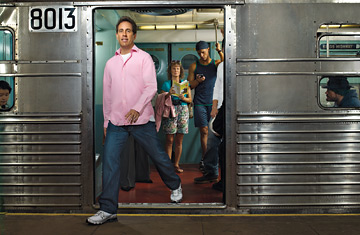
Jerry Seinfeld at the New York Transit Museum in Brooklyn, New York, on September 14, 2007..
(3 of 3)
Until Bee Movie, he had never seriously considered making a big commercial feature film. "They're too long," he says. "Comedy should be short. I don't even think they should make movie comedies. The last third is almost always torture. There's no energy left." And Seinfeld never harbored dreams of being a movie star. "If you read something somebody else wrote, no matter how well you read it, you didn't think of that," says Seinfeld. "I once had a bit I was going to try and do. I love when people talk about movies, they go, 'Oh, I loved when Brad Pitt said ...' No, no, no, no, no. Brad Pitt didn't say anything. They told Brad Pitt what to say. Brad Pitt said, 'Is the masseuse here?' That's what Brad Pitt said."
When he mentioned the idea for Bee Movie to Spielberg in 2003, "I was just trying to make witty conversation," says Seinfeld. "It was never my intention to make the movie." He said yes, however, when DreamWorks Animation offered him complete control, and he thought it sounded fun to get together some former Seinfeld writers to work with him on the script. "We had a blast," he says. Plus, computer animation "just felt so different. What if I can be funny this way? I just kind of got sucked in."
Katzenberg says animation appealed to Seinfeld "because he's a perfectionist, and it's probably the only form of moviemaking where you can actually get near perfection." Seinfeld disagrees, describing himself as "obsessive, yes; perfectionist, no." For more than three years during production, Seinfeld continued his stand-up gigs on weekends and also oversaw everything from Bee Movie's casting to the most minute hand movements of the animated characters. (He began flying out to the DreamWorks studio so often, in fact, that he eventually rented a house in Bel Air, Calif.) During the final stages of production in August, Seinfeld is listening to the film's score in the Santa Monica, Calif., studio of Oscar-winning composer Hans Zimmer. "Wow, that was Zimmer-rific," he says somewhat tentatively after listening to a few bars of music played over some footage. He's pensive for a moment, then continues, "What was that instrument that has a little pathos to it? A clarinet? That's a very emotional instrument, a very Jewish instrument. I'm not sure this is that kind of scene. It feels a little like Yentl."
A week later, the clarinet has been silenced, and after several weeks spent finishing the movie on the West Coast, Seinfeld flies off to entertain the nice folks in Colorado Springs. After the set, he bows to a standing ovation, and then he's gone, ducking into a Mercedes waiting behind the theater. "That show, for me, was one of the best ones I've had in a long time," says Seinfeld en route to the airport. "It's a focus thing. I haven't been onstage not thinking about the movie for a long time." In a few minutes, Seinfeld will fly east, just in time for son Shepherd's birthday, and he's looking forward to spending a few days with his family in the Hamptons. Still, he's perfectly happy right where he is--on the road, going to or from one stand-up gig or another. "I had a really good time tonight," he says as the car pulls into the airport. "I'm a comedian again."
